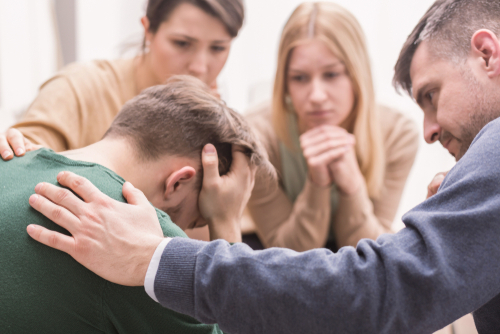
When confronted with what to say when someone dies of an addiction it is helpful to understand the basics of addiction. Addiction, also known as substance use disorder, is listed in the Diagnostic and Statistical Manual of Mental Disorders, Fifth Edition (DSM-5) as a chronic, relapsing brain disorder. It is characterized by compulsively engaging in rewarding stimuli despite harmful consequences. An individual that struggles with addiction will prioritize satisfying his or her craving above all else. This can wreak havoc in all areas of one’s life. It is not uncommon for an individual struggling with an addiction to experience relationship challenges, negative physiological effects, financial strain, run into legal complications, lack personal hygiene, and an inability to maintain steady employment. There are several contributing factors that can increase one’s susceptibility for developing an addiction (e.g., environmental factors, genetics, the drug of choice, if she abuses other drugs simultaneously, her personal health history, the presence of any co morbid disorders, etc.). However, the clinical explanation behind why an individual develops an addiction remains unknown. Put plainly: addiction is a disease and any person that dies from an addiction should be mourned and respected in the same way as anyone else.
What Do You Say?
Learning that someone has died can bring up deep seeded emotions in any person, regardless of the cause of his or her death. Furthermore, it can be complicated to support people who are going through drug-related bereavement. There is no simple phrase to say to the loved ones of someone who has died of an addiction, but there are several ways express your support. Consider the following suggestions:
- Listen: instead of prioritizing what you should be doing and making sure you are saying the right thing, prioritize listening. Be open to hearing anything they wish to share and give them the option to talk about whatever is on their mind.
- Stay neutral: although it may be difficult, it is best to abstain from judgements. For example, instead of saying “Why would you put up with that behavior!?” Say something along the lines of “That must have been really hard for you.”
- Sympathize: rather than saying “I understand how you feel,” acknowledging and honoring what the bereaved individual is faced with may be more appreciated (e.g., “I am sorry you are going through this.”).
Experts assert that an individual grieving the death of a loved one that had struggled with addiction is likely to experience even more complex and contradictory feelings and other bereaved people.
For Information and Support
Substance abuse and addiction can be incredibly dangerous and can result in severe short and long-term consequences. If you or someone you know is suffering from substance abuse or addiction, please get help as soon as possible. The earlier you seek support, the sooner you and your loved ones can return to leading happy, healthy, and fulfilling lives. There is no reason to go through this alone, and we are here to help. Please feel free to reach out to us for further information or with any questions regarding substance abuse or addiction. We are available anytime via telephone at: 213-389-9964, or you can always email us at: info@friendlyhousela.org.





